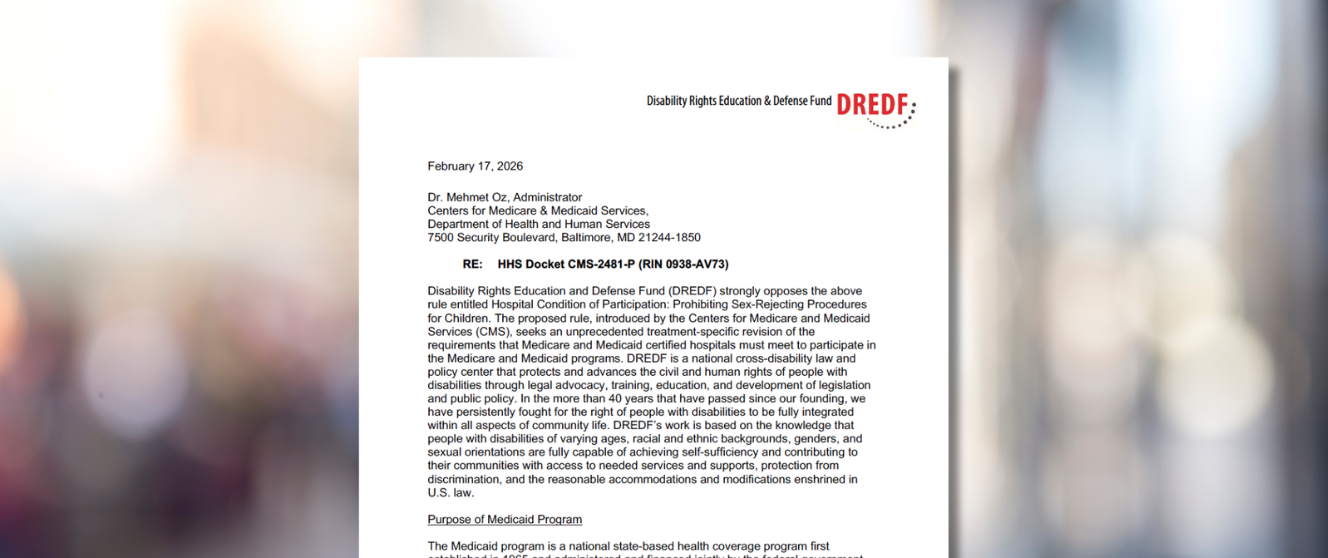
March 28, 2016
Delivered via Electronic Mail to: OIRA_submission@omb.eop.gov; DOL_PRA_PUBLIC@dol.gov; PRA@treasury.gov;
Paperwork@cms.hhs.gov
Mr. Howard Shelanski
Administrator
Office of Information and Regulatory Affairs
Office of Management and Budget
Executive Office of the President
725 17th Street, NW
Washington, DC 20503
RE: Summary of Benefits and Coverage and Uniform Glossary (CMS–10407)
Dear Administrator Shelanski:
Disability Rights Education and Defense Fund (DREDF) appreciates the opportunity to comment on the Summary of Benefits and Coverage (SBC), Uniform Glossary, and other supporting materials published by the Internal Revenue Service at the Department of the Treasury (IRS), the Employee Benefits Security Administration at the Department of Labor (EBSA), and the Centers for Medicare & Medicaid Services at the Department of Health and Human Services (CMS) (collectively, the Tri-Agencies).
DREDF is a leading national law and policy center that advances the civil and human rights of people with disabilities through legal advocacy, training, education, and public policy and legislative development. Part of our support for the Affordable Care Act (ACA) was due to its prohibition of insurance issuer discrimination against people with pre-existing conditions. The prohibition, together with the development and operation of insurance marketplaces, offered many individuals and families with disabilities a way to maintain critical health services while freely pursuing employment opportunities.
All consumers need clear and accessible information. For consumers with disabilities, however, these needs become quite specific. That is, coverage information about such topics as the treatment of habilitation services and devices durable medical equipment, orthotics and prosthetics, prescription drugs, and mental health coverage is particularly important since these are items that enable people with chronic conditions and disabilities to remain functional in their lives and communities. In addition, printed and online information needs to be accessible and effectively communicated to people with disabilities who speak primarily in sign language, use modified hardware, or software such as screen-reading technology to ensure that they are equally able to make informed choices about plans and insurance products.
These two needs motivate our brief remarks below in response to the Tri-Agencies’ request for comment on
the proposed documents associated with the Summary of Benefits and Coverage and Uniform Glossary located on CMS’ website, primarily in connection with private insurance plans pursuant to the Affordable Care Act. DREDF has also signed on to the comments submitted by the Coalition to Preserve Rehabilitation (CPR), the Independence Through Enhancement of Medicare and Medicaid (ITEM) Coalition, the Habilitation Benefits (HAB) Coalition, and the Consortium for Citizens with Disabilities (CCD) Health Task Force which address a greater breadth of concerns.
Definitions of Habilitation and Rehabilitation Services and Devices
The SBC and glossary’s treatment of rehabilitation services and habilitation services makes no reference at all to "devices," even which this is an integral part of the Rehabilitation and Habilitation Essential Health Benefit (EHB) categories. We understand that the SBC is intended to be a high-level overview of coverage written in consumer-friendly language and not a legally-precise document, the SBC nonetheless plays a key role in helping consumers understand the breadth of EHB coverage mandated under the ACA. Rehabilitation and Habilitation, in particular, are categories that have undergone changes over time with the evolution of state definitions and federal regulations. The omission of “and devices” from the glossary and SBC and the inclusion of examples that only go to services will not be legally binding, but it is likely to be confusing for both consumers and for plan representatives who may use the SBC for its intended use as a convenient shortcut to understand and explain coverage.
While we are aware “Durable Medical Equipment” (DME) is a term that is historically and commonly in use by issuers, we strongly suggest including an explicit link between DME and the Rehabilitation and Habilitation EHB categories that will prompt consumers to understand that DME is a component of those categories and appreciate why this is the fact.
We therefore recommend a definition of "Habilitation Services and Devices" as follows:
"Health care services and devices that help a person keep, learn or improve skills and functioning for daily living. Examples of such services include therapy for a child who isn’t walking or talking at the expected age, and physical and occupational therapy, speech-language pathology and other services for people with disabilities in a variety of inpatient and/or outpatient settings. Examples of such devices include oxygen equipment, wheelchairs, hospital beds, orthotics and prosthetics, and other devices."
We recommend a definition of “Rehabilitation Services and Devices” as follows:
“Health care services and devices that help a person keep, get back or improve skills and functioning for daily living that have been lost or impaired because a person was sick, hurt or disabled. Examples of such services include physical and occupational therapy, speech-language pathology and psychiatric rehabilitation services in a variety of inpatient and/or outpatient settings. Examples of such devices include oxygen equipment, wheelchairs, hospital beds, orthotics and prosthetics, and other devices."
We recommend a definition of Durable Medical Equipment that recognizes the role of such devices as components of a medically prescribed rehabilitation or habilitation program as follows:
"Equipment and supplies ordered by a health care provider for habilitative or rehabilitative purposes, including adjustment, repair, and replacement services required because of breakage, wear, loss, or a change in the patient’s physical condition."
Accessibility and Effective Communication
The “Language Access Services” heading in the SBC template refers exclusively to racial and ethnic
linguistic groups and makes no reference to the effective communication owed to people with disabilities that is required under federal civil rights laws such as Section 504 of the Rehabilitation Act of 1973 and the Americans with Disabilities Act of 1990. We recommend including a specific heading and sentence in 18 font print that provides a telephone number where a trained representative can take and fulfill a request for the SBC in an alternate format such as Braille, large font print, computer disc, or a sign-language DVD. Where the SBC is available online, there should be an email or link where individuals can input such a request or place a complaint about online accessibility issues.
Similarly, the individual and group instructions appropriately reference the need for language access services and the obligation to provide the SBC in a culturally and linguistically appropriate manner, but there appears to be a lack of information about the issuer’s obligation to provide effective communication of the SBC to people with disabilities. The instructions should clearly reference the requirement to provide effective communication of the SBC and related information in alternate formats such as Braille, large font print, electronic disc, or a sign-language DVD. There must also be reference to the obligation to ensure web and document accessibility where the SBC, glossary and supporting materials are provided online.
We support the Tri-Agencies’ incorporation of NAIC’s contribution to finalizing the SBC, glossary and supporting materials. NAIC has a very good process for engaging and melding stakeholder feedback, including the interests of consumers. NAIC, however, are not experts in disability-specific concern or in disability civil rights. DREDF appreciates this opportunity to provide additional comments and concerns directly to the Tri-Agencies. Please do not hesitate to contact us with any questions concerning the above.
Yours Truly,
Silvia Yee
Senior Staff Attorney

